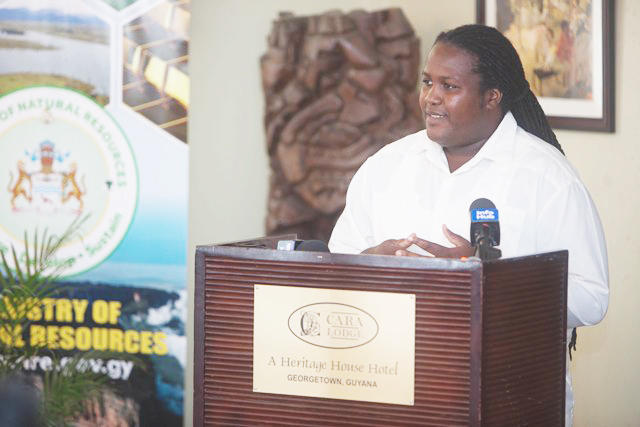-judge however says Sharma, McKenzie should have recused themselves from case
The challenge brought by activist Danuta Radzik over the Environ-mental Assessment Board (EAB) waiving an environmental survey of the Gas-to-Shore project has been dismissed by High Court Judge Simone Morris-Ramlall, who found the delay in filing the case to have been undue which she said could then result in prejudice to third parties.
In throwing out the case, the Judge ordered Radzik to pay costs in the sum of $200,000 to the EAB no later than June 3rd.
Radzik (the Applicant), was seeking an order quashing a decision made by the EAB (the Respondent) on May 10th of last year upholding the decision of the Environmental Protection Agency (EPA) to exempt the gas facility from an Environmental Impact Assessment.

Radzik also sought an order of mandamus directing the EAB to reinstate her appeal against the decision of the EPA as well as a declaration that the EAB’s decision was made in breach of the Environmental Protection Act.
The decision of the EAB had been challenged on May 22nd last, but was struck out on September 6th. It was subsequently refiled on November 23rd more than two months later.
On this point, Justice Morris-Ramlall in her decision handed down earlier this month was keen in pointing out, “effectively, therefore, there was a delay of in excess of six months in filing proper proceedings.”
She went on to state, “This Court finds that delay to be inordinate,” while going on to note that given the nature of the issue in dispute the onus was on the Applicant to file proceedings promptly.

In the ruling seen by this newspaper, the Judge noted that the delay in filing proper proceedings was the fault of Radzik’s attorney; even as she noted that within the policy of the Civil Procedure Rules (CPR), this “does not constitute a good explanation.”
That being said, however, Justice Morris-Ramlall said that Section 21 of the Judicial Review Act still required a consideration as to whether the relief sought would cause substantial hardship to, or would substantially prejudice the rights of any person, or would be detrimental to good administration.
Against this background, citing a number of case law authorities on which it relied, Justice Morris-Ramlall said that in the application before her, the decision of the EPA and its subsequent sanction by the EAB paved the way for all the stakeholders to proceed with execution of the project.
She said that given the nature of the dispute, being one similar to the grant of planning permission as dealt with in the legal authorities on which she relied, “it was incumbent on the Applicant to act promptly.”
The Judge said it was not disputed by evidence that the project is in an advanced stage and that the company and relevant stakeholders have been acting on the approval of the EPA.
“These third parties are likely to be prejudiced and suffer hardship,” she said.
Justice Morris-Ramlall said, however, that notwithstanding her observations on the possible prejudice to third parties, were the reliefs sought to be granted, she recognised that she still retained a discretion to grant such a relief.
The guiding consideration she said, is the nature of the relief sought and what it is likely to achieve.
In deference to legal precedent, the Judge highlighted that in order to give effect to the Applicant’s bare right to consultation—a right which arose purely as a result of a private arrangement—the Court would be interfering with entirely lawful conduct by third parties who in no sense brought about this problem and who have acted throughout in good faith and in reliance upon a planning permission apparently properly granted.
Applying the legal principle to the challenge before her, Justice Morris-Ramlall said that the challenge was to the constitution of the EAB when the decision of the EPA was upheld.
She said “it is not contended, for instance, that the EAB had no power to uphold the decision. Therefore, were the relief/sought to be granted, at best, what could be achieved is a redetermination of the decision to uphold the waiver.”
Justice Morris-Ramlall said that given this fact, coupled with the undue delay and consequential possibility of prejudice to third parties, “this Court declined to grant the reliefs sought, although it is satisfied that Mahender Sharma and Joslyn McKenzie ought to have recused themselves from the decision-making process of the EAB regarding the exemption of the power plant from an environmental impact assessment for the reasons contended by the Applicants.”
In the circumstances Justice Morris-Ramlall dismissed Radzik’s application ordering her to pay $200,000 costs to the EAB.
Background
Radzik had challenged the presence of two members on the EAB as a conflict of interest. The two in question were the Head of the Guyana Energy Agency Sharma and the Permanent Secretary of the Ministry of Natural Resources McKenzie.
That first action which was filed on 22nd May, 2023, challenging the EAB’s decision to uphold the Environmental Pro-tection Agency’s (EPA’s) waiver of the requirement for an Envi-ronmental Impact Assessment for the Gas to Shore Project was dismissed on 6th September, 2023 with Radzik being ordered to pay costs, to the EAB said.
The action was dismissed as it was instituted against the wrong parties—Sharma and McKenzie.
Following the dismissal of that first action, Radzik then filed the second action on 23rd Novem-ber, 2023 challenging the same decision made by the EAB.
Finding Radzik’s challenge was wrongly brought against Sharma and McKenzie; when it should instead have been filed against the environmental appeals board on which they sit, the entire case was thrown out.
In September of last year, High Court Judge Fidela Corbin-Lincoln threw out the case, finding favour with the arguments advanced by attorneys for Sharma and McKenzie.
Attorney Arud Gossai, who represented Sharma had argued that the claim needed to be struck out, since, in judicial review matters, it is the decisions of public bodies—such as a board—or a person performing a public function that can be reviewed.
Gossai and King’s Counsel Darshan Ramdhani who represented McKenzie, advanced the argument that individual members of the Environmental Assessment Board do not perform public functions.
They argued this against the background of stating that the decisions made by the board are done as a collective, by the board and not by any single individual.










